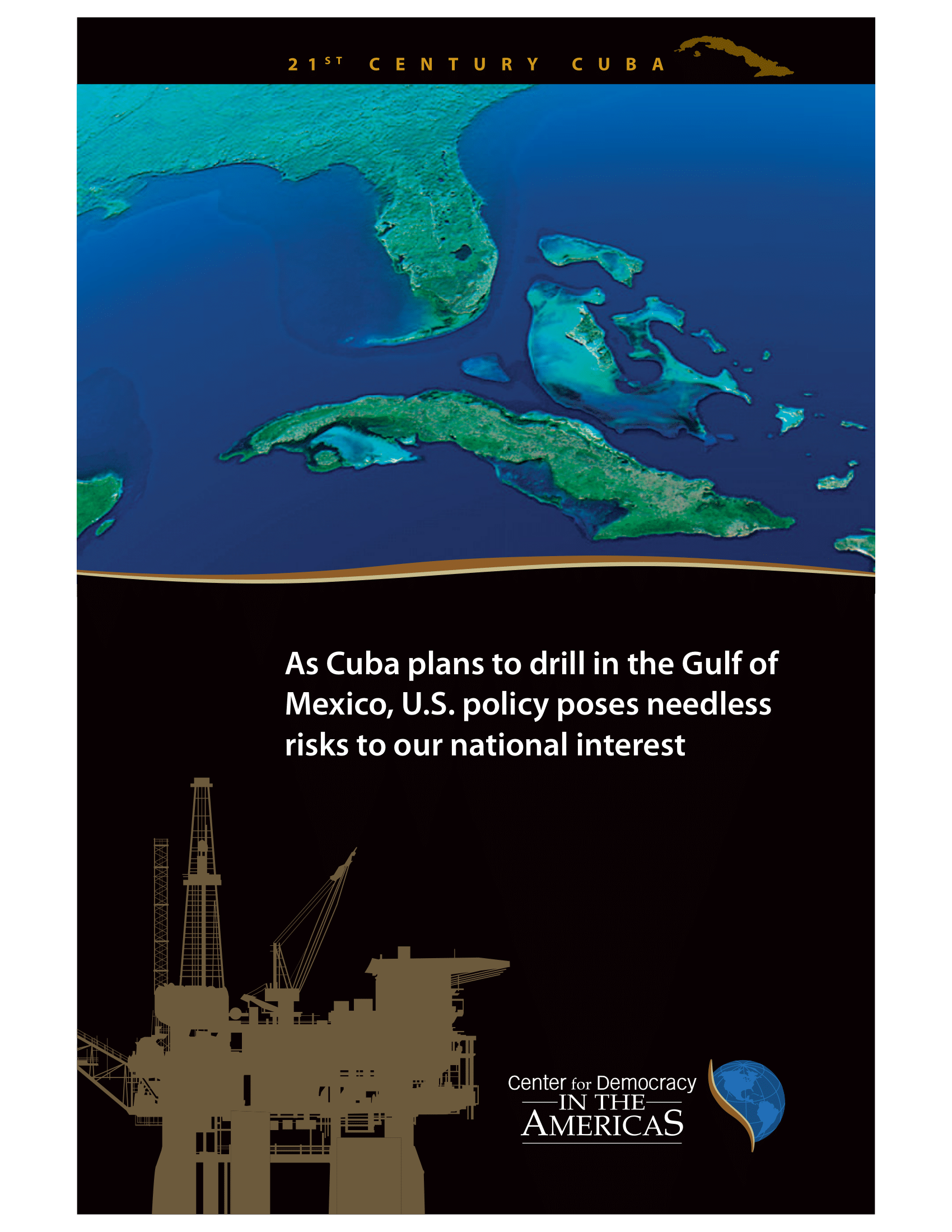As Cuba Plans to Drill in the Gulf of Mexico, U.S. Policy Poses Needless Risks to U.S. National Interest
This year Cuba and its foreign partners will begin drilling for oil in the Gulf of Mexico. Drilling will take place as close as 50 miles from Florida and in sites deeper than BP’s Macondo well, where an explosion in April 2010 killed 11 workers and created the largest oil spill ever in American waters. Undiscovered reserves of approximately 5 billion barrels of oil and 9 trillion cubic feet of natural gas lie beneath the Gulf of Mexico in land belonging to Cuba, according to the U.S. Geological Survey, although Cuba’s estimates contain higher figures. The amount actually recoverable remains to be seen.
Finding oil in commercially viable amounts would be transformative for Cuba. Revenues from natural resource wealth have the potential to provide long-sought stability for Cuba’s economy and are likely to significantly alter its relations with Venezuela and the rest of Latin America, Asia and other leading energy producing and consuming nations. Discoveries of commer- cially viable resources would also have an enormous impact upon the Gulf environment shared by Cuba and the United States.
The U.S. embargo against Cuba, a remnant of the Cold War, is an obstacle to realizing and protecting our interests in the region. Not only does it prohibit U.S. firms from joining Cuba in efforts to extract its offshore resources, thus giving the competitive advantage to other foreign firms, but it also denies Cuba access to U.S. equipment for drilling and environmental protection—an especially troubling outcome in the wake of the disastrous BP spill. The embargo compels Cuba’s foreign partners to go through contortions—such as ordering a state of the art drilling rig built in China and sailing it roughly 10,000 miles to Cuban waters—to avoid violating the content limitations imposed by U.S. law.
Most important, due to the failed policy of isolating Cuba, the United States cannot engage in meaningful environmental cooperation with Cuba while it develops its own energy resources. Our government cannot even address the threat of potential spills in advance from the frequent hurricane activity in the Gulf or from technological failures, either of which could put precious and environmentally sensitive U.S. coastal assets—our waters, our fisheries, our beaches—at great peril.
The risks begin the moment the first drill bit pierces the seabed, and increase from there. Yet, our policy leaves the Obama administration with limited options:
It could do nothing.
It could try to stop Cuba from developing its oil and natural gas, an alternative most likely to fail in an energy-hungry world, or
It could agree to dialogue and cooperation with Cuba to ensure that drilling in the Gulf protects our mutual interests.
Since the 1990s, Cuba has demonstrated a serious commitment to protecting the environment, building an array of environmental policies, some based on U.S. and Spanish law. But it has no experience responding to major marine-based spills and, like our country, Cuba has to balance economic and environmental interests. In this contest, the environmental side will not always prevail.
Against this backdrop, cooperation and engagement between Cuba and the United States is the right approach, and there is already precedent for it. During the BP crisis, the U.S. shared information with Cuba about the spill. The administration publicly declared its willingness to provide limited licenses for U.S. firms to respond to a catastrophe that threatened Cuba. It also provided visas for Cuban scientists and environmental officials to attend an important environmental conference in Florida. For its part, Cuba permitted a vessel from the National Oceanic and Atmospheric Administration to look for damage in Cuban waters. But these modest measures, however welcome, are not sufficient, especially in light of Cuba’s imminent plans to drill.
Under the guise of environmental protection, Reps. Ileana Ros-Lehtinen and Vern Buchanan, Members of the U.S. Congress from Florida, introduced bills to impose sanctions on foreign oil companies and U.S. firms that help Cuba drill for oil, and to punish those foreign firms by denying them the right to drill in U.S. waters. This legislation would penalize U.S. firms and anger our allies, but not stop Cuba from drilling, and will make the cooperation to protect our mutual coastal environment more difficult should problems occur.
Energy policy and environmental protection are classic examples of how the embargo is an abiding threat to U.S. interests. It should no longer be acceptable to base U.S. foreign policy on the illusion that sanctions will cause Cuba’s government to collapse, or to try to stop Cuba from developing its oil resources. Nor should this policy or the political dynamic that sustains it prevent the U.S. from addressing both the challenges and benefits of Cuba finding meaningful amounts of oil in the Gulf of Mexico.
The path forward is clear. The Obama administration should use its executive authority to guarantee that firms with the best equipment and greatest expertise are licensed in advance to fight the effects of an oil spill. The Treasury Department, which enforces Cuba sanctions, should make clear to the private sector that efforts to protect drilling safety will not be met with adverse regulatory actions. The U.S. government should commit to vigorous information sharing with Cuba, and open direct negotiations with the Cuban government for environmental agreements modeled on cooperation that already exists with our Canadian and Mexican neighbors.
Most of all, the administration should replace a policy predicated on Cuba failing with a diplomatic approach that recognizes Cuba’s sovereignty. Only then will our nation be able to respond effectively to what could become a new chapter in Cuba’s history and ours.
There is little time and much to do before the drilling begins.
Sarah Stephens
Executive Director
February 2011

